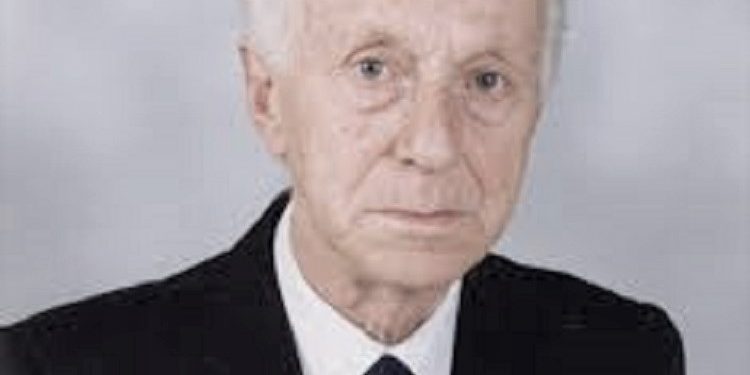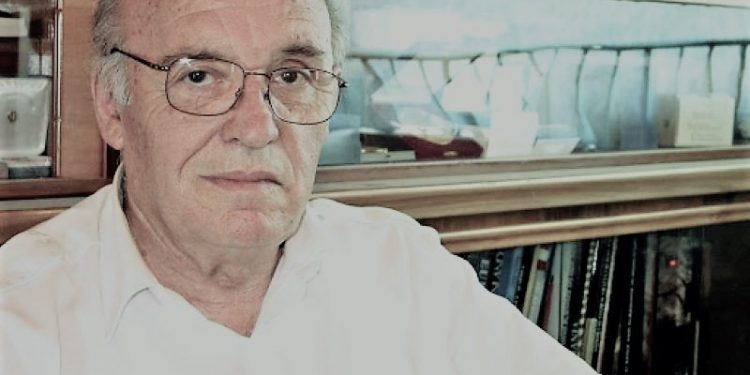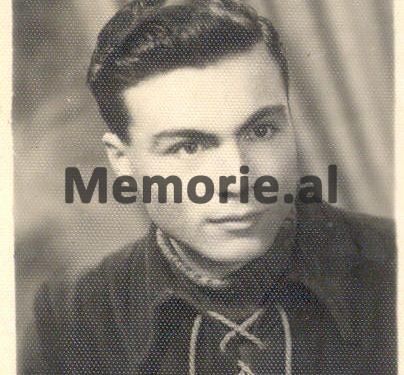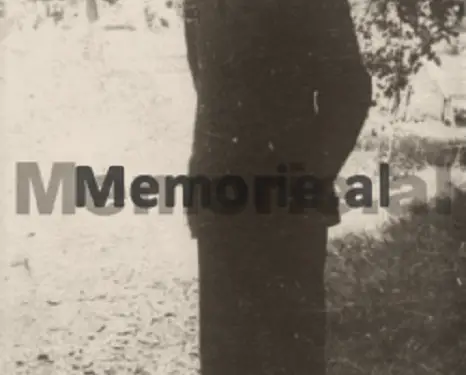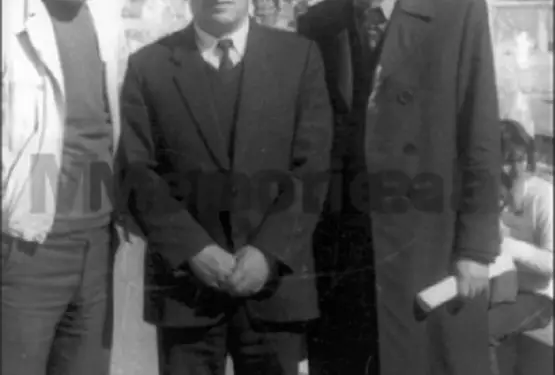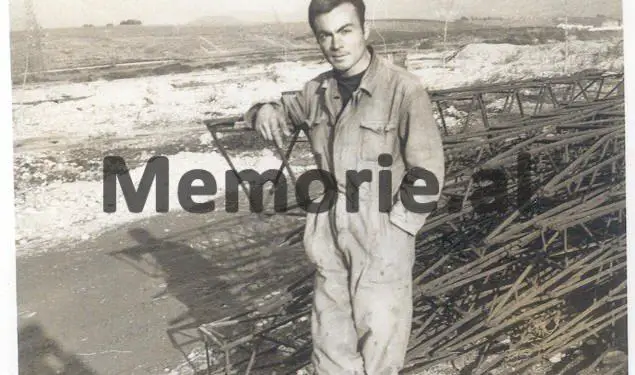Dashnor Kaloçi
Memorie.al publishes the unknown story of Uran Kalakulla, originally from Libohova in Gjirokastra, a descendant of a family with patriotic traditions where his ancestors graduated from Turkish universities and his father, Rasim Kalakulla, after serving as mayor of Istanbul and deputy prefect of Mosul in Iraq, with the declaration of independence of Albania, had returned to his homeland to give his contribution and died in complete misery in 1938 in Tirana, although he had held high state duties and functions. The unknown testimonies of Uran Kalakulla, who after he was able to gain a right to study for high school at the Faculty of Philology (Language and Literature branch) and served as a teacher in the villages of Berat and the district of Tirana, became associated with a group of friends which was united by hatred for the communist regime, which included: Tanush Kaso, Pjetër Arbnori, Zeqir Koçi, Kahreman Paftali, etc., who tried to form a political group, with a social-democratic tendency. The mystery of the group’s discovery in May 1961 by the State Security and their arrest and sentencing by the Tirana Court in 1962, where Kalakulla and Arbnori were initially sentenced to death by firing squad then goes down to 25 years, as well as Kalakulla’s suspicions about the man who deconstructed their group!
“The idea for the creation of our political formation that would have the shape of a party with a social-democratic tendency, we threw after many occasional talks with my friends Riza Kuçi and Emil Prenushi in 1958. But then that thing remained only in exchange of ideas and thoughts. Its concretization took place about two years later, when these conversations were joined by some other friends who were Agim Musta and Tanush Kaso by profession teachers in the district of Tirana. Then a worker from Durrës, named Kahreman Paftali, an electrician who was my nephew, joined our group. “This is how Uran Kalakulla, one of the main leaders of the group, recalled, who in 1961, tried to form a social-democratic political group, witnessing everything about that distant event, which caught the eye and was discovered by the State Security, causing all its members to end up in prisons and internments, up to the overthrow of the communist regime of Enver Hoxha and his successor, Ramiz Alia.
Kalakulla and his family?
Uran Kalakulla was born in Tirana in 1929 to an intellectual family, where his father, Rasim Kalakulla, former deputy prefect of Istanbul and mayor of Mosul, then held the post of Mayor of Tirana. The Kalakulla family is originally from the city of Gjirokastra and many of its suckers, starting with Uranus’s father, grandfather and great-grandfather, were educated at Istanbul Universities, mainly in the branches of Jurisprudence and Political Science. Uranus’ father, Rasim, died on November 28, 1938 in Tirana, and although he held high positions for almost 25 years, he left his wife with seven children not very grown up in a very difficult economic situation, having no home at all. Nor financial income to afford the minimum living conditions. Based on this, by order of King Zog, Rasim Kalakulla was escorted to the last apartment with a state ceremony, where in addition to many high personalities, there were also hundreds of residents of the capital. Even after Rasim’s death, his family continued to live in the capital and until the late 1950s, when, under Russian influence, official Tirana somewhat mitigated the class struggle and offered study rights for ” reactionary families ”, Urani took advantage of this and received a right to study to continue his higher studies in the branch of Language and Literature (by correspondence) at the University of Tirana, as until then, he worked as a teacher in Berat and in the villages of the district of Tirana.
The idea of forming a political grouping
Given the origin of the Kalakulla family, Uranus had an ideological formation with right-wing tendencies and this is ingrained in him even more and even more from the tragic fate of his two brothers-in-law (my wife’s brothers), Myzafer and Arshi Pipa, where Myzaferi died in torture in the communist investigation of Shkodra, while Arshiu, crossed the border somewhere in the villages of the district of Shkodra where he worked as a teacher, fleeing first to Yugoslavia and then as a political asylum in the US. His sister’s husband, Astrit Delvina, a well-known writer and intellectual, who spent many years in prison and internment under the communist regime of Enver Hoxha, also had a significant influence on Uranus. Growing up and formed in such an environment, Uranus did not agree with the communist regime and based on this, he connected with some of his close friends, to create a political formation clandestinely. In this regard, Urani recalled: “The initial idea for the creation of our political formation, which would have the shape of a party with a social-democratic tendency, we threw after many occasional conversations with my friends, Riza Kuçi and Emil Prenushi from 1958. Until then, this was only an exchange of ideas and opinions and its concretization took place about two years later, in 1960, when Tanush Kaso and Agim Musta, who were by profession, joined our group teachers in the district of Tirana “, Kalakulla recalled, their adventure, how the idea for creating a political group with a social-democratic tendency was initially put forward.
Group creation and tasks
But what happened next with those four young intellectuals who embarked on that dangerous adventure to form an opposition group, in the face of a totalitarian communist regime that controlled everything? In this regard, Uran Kalakulla recalled: “The plan for the concretization of our group, as I said we made it a reality there in August 1960 and then in our group approached a worker from Durrës, who worked as an electrician and was my nephew, Kahreman Paftali. Our group started to meet regularly once a month, where we met sometimes in nature and sometimes in the classes of the Faculty of Philology, because at that time, some of us were correspondence students at that faculty. Those meetings where we discussed and made political analysis of the internal and external situation, we continued until May 1961. There we also talked about organizational problems and the expansion of the group with new members, discussing and providing the technique of proper for printing the materials we would print. These problems were only in the form of project ideas, but specifically neither neither the printing of our program nor the casting of any tract was decided there. Even in those meetings we did not even keep any minutes, to avoid material evidence in case the group was discovered. “For the technique, Kahramani was charged, who would create a special kind of machine, so that the State Security could not identify where our materials were printed”, Kalakulla recalled, the first meetings with his friends and the procedures how to function that group.
Expansion of the group with Pjetër Arbnori
Then the members of that group thought of expanding their ranks and for this, Kalakulla testified: “One of the tasks that our group had was to extend and further expand it, but that had to be done with a very conspiracy big. This expansion of the group was primarily intended to take place in Tirana, but also in other cities of the country, where each of us could have trusted friends and relatives. For this it was decided that each of us would have contact with two trusted persons, whom only he would know and they would not have known who the other members of the group were. The whole course of the group could be known only by the chairman of the group, not even he had to know them all. In the context of this expansion, Tanush Kaso, in one of these meetings mentioned the name of an old friend of his, who knew him since the time of the eight-year school in Shkodra, whom he had met after many years in Durrës. At the next meeting, Tanushi insisted that I get to know his friend. Although contrary to the rules we had set before, I agreed to meet Tanush’s friend and the meeting took place in one of the bars in the center of the city of Durrës. Tanushi and I attended that meeting, and his friend was called Pjetër Toma, or Arbnori, as he was otherwise known. Along with Peter, that day at that meeting came a friend of his, completely unknown, not only to me, but also to Tanush, whom Peter himself introduced to us. That person was called Zeqir Koçi and was originally from Golloborda and worked as a technician in a construction company in the city. At first glance, Peter seemed to me to be a young man with a charming face and eyes that radiated intelligence. While Zeqiri, a more mature and good-natured man with thick hair and a mustache like Stalin. From the conversations we had, Peter seemed to be in a hurry to empty all his arsenal and intellectual baggage, entering the subject quickly, without the slightest reservation, and I was convinced that he thought that only the four of us were the initiators of that the political group, without knowing at all that we had a year to have such a group “, recalled Urani, the expansion of the group and the first meeting with Pjetër Arbnori.
Detection of the group by the State Security and arrest
After the ’90s, although almost 40 years had passed since then, even after meeting dozens of times with all members of that group, Uran Kalakulla, it was still not clear how that group was discovered and about that said: “The discovery of our group, which necessarily led to his arrest and liquidation, to this day has remained for me an equation with many unknowns. I have two clues, but I still do not know the full truth. She does not know where it is hidden in the conscience of any participant in the group, or of those who would be attached to him possibly later. That thing unfortunately to this day for me has remained a great enigma, for which I cannot blame anyone, although I insist on several variants. “One of them was confirmed to me by Pjetër Arbnori, during a conversation during the court days, which we agreed on,” Kalakulla recalled, regarding the great enigma of how their group was discovered.
Meetings with members of the group, before the arrest!
Regarding the meetings of the members of the group shortly before they were discovered by the State Security, Urani recalled: -program, which we really wanted to see. I told Peter that the work was not necessary, without telling him that we had our own program, though unwritten. But since he insisted, we told him to come to my house in Tirana on May 27, together with Zeqiri. Where Tanushi would be, we would watch the program designed by Zeqiri. We left the meeting at two o’clock and no delays or absences were allowed. Absence meant either the death of any of us, or arrest. But on the appointed day and hour, they did not come! As we found out later, at 9:00 that day, the State Security went and arrested Zeqiri at his office, while he was printing the second part of the program, which had been drafted by Peter. “Pjetri himself was arrested that day at 12 noon, while Tanush Kason and I were arrested that evening around 5.30 pm, while we were walking on the main boulevard of Tirana”, Urani recalled the arrest of him and his friends others of the group, by the State Security, who had apparently uncovered all their ‘threads’.
Investigation and trial
Regarding the investigation period, where Uranus was accused of being one of the main members of that group, he recalled: “During the investigation process, the Deputy Minister of Interior, Major General Mihallaq Ziçishti, came to hear nonsense that I had never heard, after cursing me with what he put in his mouth, he punched me in the jaws, drawing blood. He had undertaken to dismantle us in the group, but he did not walk, as he had thought. After an investigation that lasted about a year, on August 8, 1962, our group together with the two members of Durrës, who were Pjetër Arbnori and Zeqir Koçi, appeared before the court in Tirana. The trial, which lasted for four days in a row, took place in the District Court of Tirana, at the building that is still located today on Durrës Street, right next to the Ministry of Education. It was held behind closed doors and with invitations only to a few party officials and State Security people, and none of our family members were allowed to attend those sessions. Our trial was conducted by a team of the Military Court of the Tirana district, headed by Colonel Llazi Polena and his assistants, members: Captain Reshat Nepravishta and another named Mexhit. The prosecutor was Major Sami Kapllani, who, as I found out a little later, had himself been imprisoned for ordinary crimes; it seems to me accused of theft. On the fourth day of our trial, the decision was made: Pjetër Arbnori and I were sentenced to death (by firing squad), Zeqir Koçi to 20 years in prison, Riza Kuçi to 15, Agim Musta and Tanush Kaso to 13 each and the last Kahraman Paftali with 10 years ”.
Sudden death on May 4, 2001
After the death sentence for both Uran Kalakulla and Pjetër Arbnori, they were pardoned by the Presidium of the People’s Assembly and the sentence was commuted to 25 years in prison. Uranus spent a total of 21 years in prison, suffering most of it in Burrell’s horrific prison. He left there in 1982 and after working for a year as an employee in the Municipal Enterprise of Shkodra, they were interned with their families, for five years in the village of Kryevidh in Kavaja. There he worked in the heaviest agricultural jobs, until 1988, when he retired. With the collapse of the communist regime in 1991, Uranus took an active part in the democratic process and in the establishment of the Association of the Politically Persecuted, mainly in the city of Shkodra. He has also dealt with journalism and published a total of four books. His fourth book, entitled 21 Years of Communist Prison, was published in June 2001 and inaugurated on May 4 in one of the halls of the Academy of Sciences, but Uranus himself failed to attend. A serious illness that was diagnosed by doctors at the end of June 2001, as if by accident, caused him to die, at the very moment when his friends, comrades and accomplices completed the presentation of the book. On May 6, 2001, he was escorted to his last home with all honors, by friends, relatives, friends and many of the former political persecuted, who at his funeral said they would always remember him with the greatest respect, as an example of resistance to the communist dictatorship./Memorie.al




